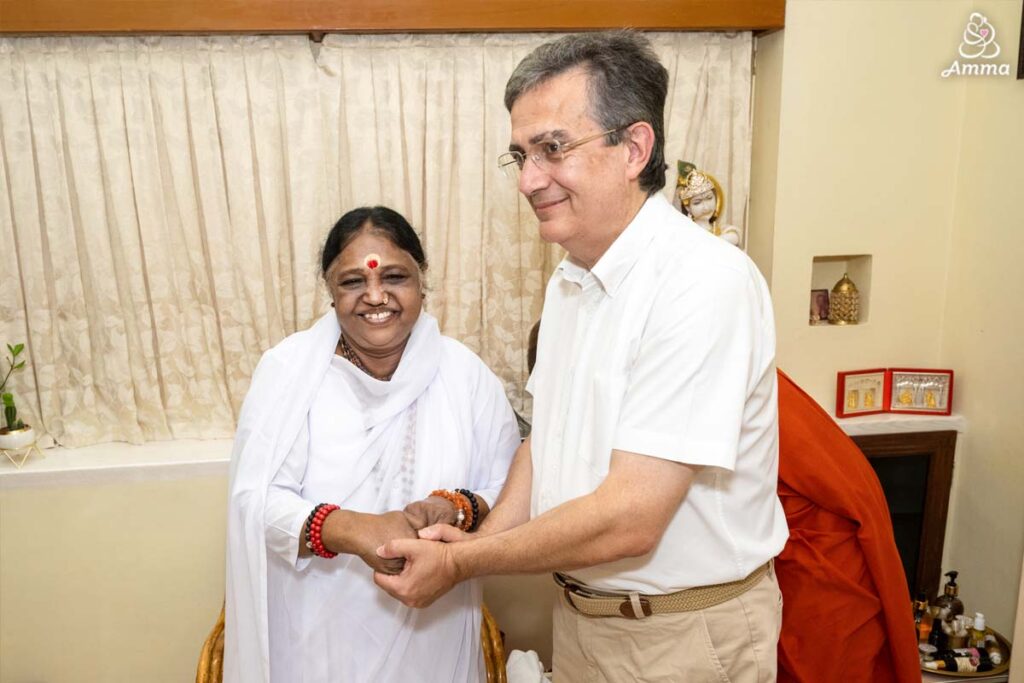Amrita Hospital, Faridabad achieved a significant milestone by becoming the first medical institution in the region to offer interstitial brachytherapy, a specialized cancer treatment not available in other healthcare facilities locally. Using this technique, a 65-year-old woman hailing from this district was provided with a new hope for life by doctors at the hospital as they treated her recurrent cervical cancer using cervical transrectal-guided interstitial brachytherapy.
“At present, I am free of cervical cancer and there is no bleeding in my body as well. I thank the doctors at Amrita Hospital, Faridabad who were extremely kind and helpful since I set foot on the hospital premises. With their guidance, I am now stepping towards a normal life like the one I used to live before getting diagnosed again with this disease,” said the patient.
Cervical cancer, a formidable adversary in the realm of women’s health, poses a significant threat due to its potentially silent progression and life-threatening implications. Primarily caused by persistent infection with high-risk types of human papillomavirus (HPV), cervical cancer can develop stealthily, making early detection crucial for effective intervention. If left untreated, this malignancy can swiftly advance, invading surrounding tissues and, in advanced stages, spreading to distant organs.
She was first diagnosed with cervical cancer and subsequently treated in 2003, and then saw a recurrence of the disease twenty years later. She was referred to Amrita Hospital, Faridabad, for interstitial brachytherapy to address the recurrent carcinoma cervix. Having previously undergone treatment and experiencing recurrent bleeding from the vagina, she had exhausted other available treatment options. Interstitial brachytherapy, considered the last resort for disease control, was recommended to manage her condition effectively.
At present, I am free of cervical cancer and there is no bleeding in my body as well. I thank the doctors at Amrita Hospital, Faridabad who were extremely kind and helpful since I set foot on the hospital premises.
Patient
“The woman was earlier treated with chemoradiation and external beam radiation which are common practices. Owing to fibrosis of her uterus and parametria from prior treatments, her case required a specialized treatment approach. Faced with recurrent cervical cancer and complications from prior treatments, the patient required urgent intervention.” said Dr. Bhaskar Vishwanathan, Professor and HoD, Radiation Oncology, Amrita Hospital, Faridabad.
“Cervical transrectal-guided interstitial brachytherapy is a specialized and innovative approach, delivering targeted, high-dose radiation directly to the tumour while sparing healthy tissues. Utilizing the MUPIT applicator, pre-brachytherapy MRI, and real-time guidance, this technique showcased its prowess in minimizing side effects. Considering the patient’s history of radiation therapies, the delicate balance of providing an effective dose to the cancer while preserving surrounding organs was achieved. The entire procedure lasted for 1 hour with anaesthesia.”
Cervical transrectal-guided interstitial brachytherapy, while potent, is not regularly practice in India, making this procedure especially noteworthy. It is a specialized technique that utilizes rectal ultrasound for tumour visualization in the cervix and parametrium. This procedure involves the precise placement of brachytherapy needles to ensure targeted delivery of radiation to the tumour while minimizing unnecessary exposure to critical structures such as the bladder, rectum, and bowel.
The goal is to optimize the dosage to the tumour regions while safeguarding surrounding normal tissues. The procedure’s rarity, coupled with the challenge posed by the fibrosed parametria, made for a delicate balance that needed to be struck. Despite these challenges, a team of doctors at Amrita Hospital, Faridabad, comprising of Dr. Bhaskar Vishwanathan; Dr. Rishabh Kumar, Assistant Professor in Radiation Oncology; and Dr. Nivedita Sarkar, Senior Consultant, Radiation Oncology, were able to successfully carry out the surgery with minimal bleeding and no complications.
Dr. Rishabh Kumar said, “During the procedure, we encountered the challenge of managing vaginal bleeding, a complication effectively addressed by brachytherapy. This approach proved to be the swiftest and most efficient method for controlling the bleeding. Following the surgery, a detailed post-operative roadmap has been laid out for her. The patient did extremely well at her one-month follow-up. Regular follow-ups, a balanced diet, and healthy lifestyle practices are on the agenda to ensure she continues to do well. Re-irradiation cases like these will also need close monitoring for potential long-term side effects.”
This case stands as a testament to the capabilities of modern radiation oncology and furthers the notion that with the right tools, skill, and determination, even the most difficult cases can see a ray of hope. The success of this procedure paves the way for more such interventions in the future, painting a brighter picture for patients with similar conditions.





